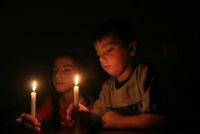 Decorating their food dishes with candles, Gazans prepare their Ramadhan iftar meal after long hot fasting hours in darkness due to daily electricity outage.
Decorating their food dishes with candles, Gazans prepare their Ramadhan iftar meal after long hot fasting hours in darkness due to daily electricity outage.
"We cannot run fans because the power has been cut,” construction worker Abu Khaled Abu Arab told Bernama news agency on Monday, July 30.
“There are no signs of life here.”
The 1.6 million Gazans lose their electricity for one third of their days during the fasting month of Ramadhan.
Gaza's precarious energy supply is bad at the best of times, with a rickety infrastructure system badly degraded during a deadly Israeli onslaught in 2008.
Zionist regime's bombardment of Gaza's power plant destroyed six transformers and at present, only one transformer is operating at a much-reduced capacity.
The situation has been made worse as Ramadhan, which started on July 20, came in the summer long hot days.
Living in a stuffy dwelling in the Shatii refugee camp, home to 65,000 refugees, Abu Khaled and his five children need to have their Ramadhan iftar quickly before sitting outside their homes.
At least, he finds fresh air outside his modest home to escape the scorching heat inside his two-room-shack.
“During the Iftar time, we have to wipe off our sweat, instead of enjoying the food,” Abu Khaled said.
As everything turns quiet at Iftar and Sahur (pre-dawn meal) times, the piercing sounds of mobile generators are heard in almost every town and camp.
Yet, with expensive prices of rare fuel, many Gazans could not run their generators.
“Fuel is very expensive now,” Abu Khaled, 43, said.
“I need to save money to satisfy the basic demands of my family," he said, referring to the fuel crisis in the narrow enclave.
Fuel prices are double what they were last year.
The fuel crisis escalated when Egypt decided to reduce the amount of fuel brought to Gaza.
The intolerable heat inside the houses located in densely-populated areas encouraged hundreds of thousands to come to a spot in the vicinity of the Mediterranean Sea, off the Gaza coast, where families have erected tents.

















